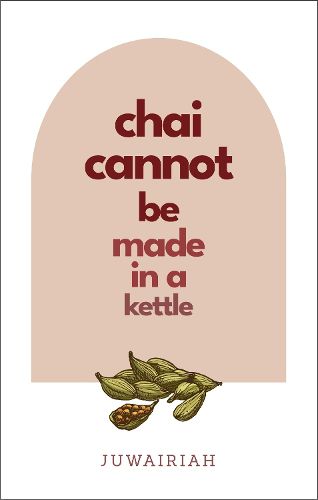Readings Newsletter
Become a Readings Member to make your shopping experience even easier.
Sign in or sign up for free!
You’re not far away from qualifying for FREE standard shipping within Australia
You’ve qualified for FREE standard shipping within Australia
The cart is loading…






This title is printed to order. This book may have been self-published. If so, we cannot guarantee the quality of the content. In the main most books will have gone through the editing process however some may not. We therefore suggest that you be aware of this before ordering this book. If in doubt check either the author or publisher’s details as we are unable to accept any returns unless they are faulty. Please contact us if you have any questions.
In chai cannot be made in a kettle, Juwairiah speaks of belonging, straddling the gaps between cultures, outlooks and worldviews, and embracing the dissonance of her identity as a British, Muslim, Indian woman. Her verses explore the meaning of home as a multicultural and multilingual household. 'Some mornings, / I peep through the keyhole, / watch her and her father converse in Swahili./ I do not understand their language so instead/ I watch her tongue dance.'
She writes about her connection to her faith and community, poignantly articulating the ways in which these are misunderstood, marginalised and commodified in modern-day Britain, and the verbal and cultural acrobatics involved in having an identity that bridges cultural and linguistic divides. 'We surrendered syllables so that we would fit in, / muted rhymes and rhythms so we weren't booted out.'
Scents and flavours evoke a lost heritage in many of the poems in chai cannot be made in a kettle. The rituals of community and faith create a background rhythm to Juwairiah's poems, the ache of a wistful collective memory interacting with the everyday liminal realities of life as a British Indian woman: 'I heard whispers of brown sacred women, / who lay under darkness, longing for their motherland./ A place where bodies bathe in sweet honey milk, / doused in ancient cardamom pods.'
$9.00 standard shipping within Australia
FREE standard shipping within Australia for orders over $100.00
Express & International shipping calculated at checkout
This title is printed to order. This book may have been self-published. If so, we cannot guarantee the quality of the content. In the main most books will have gone through the editing process however some may not. We therefore suggest that you be aware of this before ordering this book. If in doubt check either the author or publisher’s details as we are unable to accept any returns unless they are faulty. Please contact us if you have any questions.
In chai cannot be made in a kettle, Juwairiah speaks of belonging, straddling the gaps between cultures, outlooks and worldviews, and embracing the dissonance of her identity as a British, Muslim, Indian woman. Her verses explore the meaning of home as a multicultural and multilingual household. 'Some mornings, / I peep through the keyhole, / watch her and her father converse in Swahili./ I do not understand their language so instead/ I watch her tongue dance.'
She writes about her connection to her faith and community, poignantly articulating the ways in which these are misunderstood, marginalised and commodified in modern-day Britain, and the verbal and cultural acrobatics involved in having an identity that bridges cultural and linguistic divides. 'We surrendered syllables so that we would fit in, / muted rhymes and rhythms so we weren't booted out.'
Scents and flavours evoke a lost heritage in many of the poems in chai cannot be made in a kettle. The rituals of community and faith create a background rhythm to Juwairiah's poems, the ache of a wistful collective memory interacting with the everyday liminal realities of life as a British Indian woman: 'I heard whispers of brown sacred women, / who lay under darkness, longing for their motherland./ A place where bodies bathe in sweet honey milk, / doused in ancient cardamom pods.'